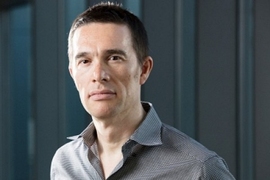For small health-care groups like dentist’s offices, one sick staff member can mean a day’s worth of cancelled appointments. Such offices can either continue short-staffed, which could negatively affect patient care, or reschedule appointments, potentially delaying critical procedures and screenings.
The MIT alumnus-founded Stynt is solving that problem by helping health care offices fill last-minute shift openings for positions including dental hygienists, assistants, office managers and dentists. Stynt’s online platform lets offices post openings that qualified professionals can then bid on.
“We’re a software-as-a-service marketplace with a focus on health care staffing,” founder and CEO Alex Adeli MBA ’17 says. “We provide health care facilities with credentialed professionals extremely fast, in most cases within 15 minutes or less. These offices get direct access to certified professionals who are seeking open positions in their area of expertise, at their desired pay rate, within their preferred geography.”
The platform onboards professionals by verifying their credentials, work experience, and conducting reference checks. It then lets professionals set their own schedule and desired hourly rate. Algorithms alert them to relevant work in their area and suggest bids.
Stynt also provides workers’ compensation, health benefits, insurance, personal time off, human resource services, and payroll services, which simplifies the hiring process and provides a safety net to workers.
The company is already working with more than 5,000 offices around the U.S. and 40,000 professionals. Last week, the nation’s largest dental association, the American Dental Association Members Advantage, endorsed Stynt to serve as their staffing solution nationwide, which Adeli believes will help Stynt achieve its goal of working with the majority of dental facilities in the U.S. by 2025.
Some professionals finding work on Stynt’s platform are new graduates that utilize Stynt as a gateway to full-time jobs. Others work a few days a week at offices that don’t have enough business to give them more hours. Another set of Stynt’s workers have young children or other family obligations and like to personalize their schedules depending on needs.
“I’m a single parent with two children and love the flexibility of working as often or as little as I need or prefer,” says Cathryn Schnackenberg, a registered dental hygienist on Stynt’s platform. “I never have to worry about asking for time off for vacation, sick children, doctor’s appointments, or just a ‘day of rest.’ I’m even given sick time pay with the hours I accrue through temping.”
A hands-on education
Before founding Stynt, Adeli owned and ran multiple dental offices around Boston. Through that experience he saw firsthand the disruptions that come when employees can’t show up for work.
Larger offices can call on other employees to fill in, but for smaller offices, the scramble to replace workers often involves calling temporary staffing agencies then waiting for them to make calls through their network.
When those agencies do find workers, the pricing and worker credentials can be extremely variable. When they don’t find workers, offices often have to cancel their appointments for the day.
“Our schedule was booked several months in advance, so if our employees didn’t show up, patient access to care was compromised,” Adeli says.
In 2014, inspired by the rise of marketplace platforms like Uber, Adeli decided to build a software as service for health care professionals interested in shift work to find temporary job openings. It worked so well for his offices that he showed it to other dental offices in the area. Soon he had a small network of dental offices that could share a pool of workers, helping them operate like bigger companies in the industry.
Adeli had always wanted to go to business school, and around the middle of 2015, in the same month he decided to sell his dental business and commit himself to running Stynt full time, he was accepted to MIT’s Sloan School of Management.
At MIT, Adeli was able to apply the principles he learned in the classroom to his business in real-time. He created pricing algorithms while taking economics classes. He designed the bidding and matching features of his platform while learning about supply and demand. As he took data analytics classes, he incorporated systems for gathering and labeling data into Stynt’s system.
“We set a great foundation as a result of the education I was receiving,” Adeli says.
Adeli also believes he learned as much from his classmates as he did from his professors.
“When you’re CEO, you don’t have a team of peers around you,” he says. “When you’re at a place like MIT, you can learn from all these great minds around you, and your mind expands.”
By the time Adeli graduated in 2017, Stynt was being used in seven states and beginning to work with larger health care organizations.
Helping small businesses
Today Stynt is helping small health care offices navigate hiring regulations across the U.S. Many states have, for instance, different employment classifications, tax requirements, and standards around liability and benefits.
“We’re standardizing classification of employment for health care professionals across the country,” Adeli says. “We have fully underwritten workers compensation, malpractice, and general liability insurances and a team of HR specialists that basically allows us to scale everywhere. Our payroll service is also in compliance for tax purposes across all states. This was a huge burden for many small offices.”
Stynt also provides its workers with professional development training, compliance certifications, and coaching on best practices in their industry.
During the pandemic, Adeli says Stynt helped keep offices running as they struggled through forced closures and, later, ramping back up as the federal government changed its definition of essential businesses.
Overall, Adeli is proud to be helping small health care offices “punch above their weight” in terms of running more smoothly with limited resources.
“What we’re trying to do is make the market more efficient,” Adeli says. “We’re allowing stranded capacity of both sides to come together. So, if you’re a health care professional working four days a week and you have two days available, and an office is in need of someone, we want to make sure you can link up in real-time.”








